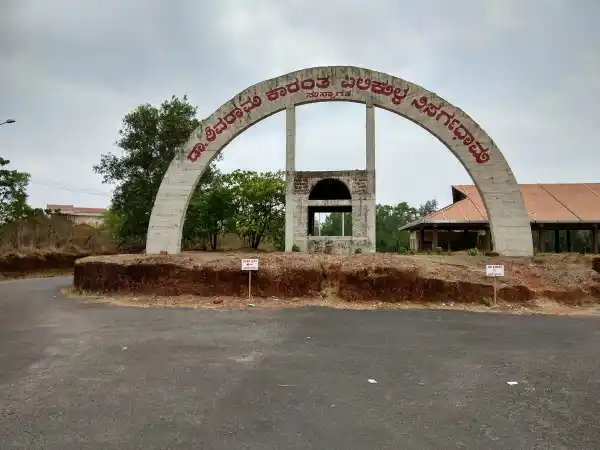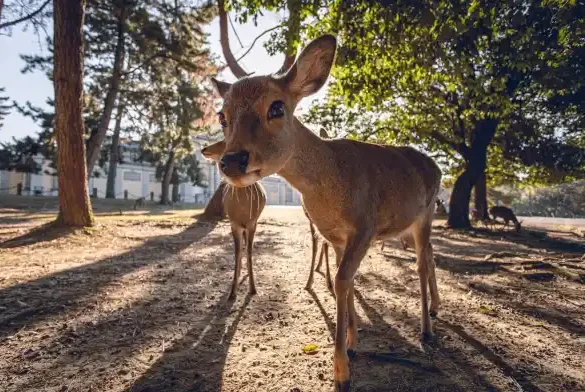Out of all the things Mangalore is popular for it certainly holds a prominent position when it comes to amazing landscapes. And how can we ignore the vegetation when we are talking about the landscapes of a location? However if there is something that thrives well in a perfect landscape surrounding lush greenery is a Biological park. And the Pilikula Biological Park Mangalore is no exception either. The Pilikula Biological Park in Mangalore is one of the richest biological parks that you can find. This is however not just a biological park but also a full fledged zoological garden. Alongside it also serves as a breeding ground of varieties of animal species along with being a nesting ground for bird species as well.
The Pilikula Biological Park, Mangaluru, Karnataka is one of the locations that you certainly cannot miss out on visiting. However, it is located inside the premises of the Pilikula Nisargadhama Mangalore, which is an infotainment park in Mangalore. Moreover, with multiple entertaining and educational zones it offers varied activities here. It is an ideal location that botanists and zoologists love visiting. Also this is an ideal location for students and kids. Keep on reading this article as this will be a helpful read for you if you are planning a trip to the Pilikula Biological Park.
Pilikula Biological Park Mangalore
Location: Moodushedde Road, Pilikula, Mangalore, Karnataka
Timings: The timings of the Pilikula Biological Park are from 9:30 am to 5:30 pm on all days from Tuesday to Sunday. Mondays are closed. Also along with that the park remains closed on Public Holidays as well.
Tickets: The Pilikula Biological Park entry fee is Rs. 60 per person for Indian adults above the age of 10 years. For foreigners the entry fee is Rs. 100 per person. Pilikula Biological Park ticket price for children from 3 years to 10 years is Rs. 20 per person. And for children below 3 years of age entry to the biological park is free.
Also there is a special ticket price for students as well. For a group of 15 students or more from 3 years to 10 years of age the entry fee is Rs. 15 per person. And for a group of 15 students or more from high school or college it is Rs. 40 per person.
For a still camera there is an additional charge of Rs. 30 and for a video camera the charge is Rs. 125.
Overview :
The Pilikula Nisarga Dham is basically an Eco-Education Tourism Development Project that the district administration of Dakshina Kannada promotes in the city of Mangalore in the State of Karnataka. Furthermore Pilikula Biological Park is one of the major attractions of the Pilikula Nisargadhama Mangalore. The Pilikula Biological Park extends for over an area of 150 acres. On the basis of the prevailing rules, regulations and laws the Central Zoo Authority of India has also recognized this biological park as a major zoo. What makes this biological park even more interesting is the way it follows modern day zoological practices. Moreover on the basis of modern zoological regulations here the authority houses the animals in spacious enclosures. They also maintain that the animals can stay as close as possible to their natural habitat.
There is a well equipped veterinary hospital complex inside the premises as well. Moreover, this hospital has facilities like treatment, post treatment, quarantine, post mortem block, ultrasound and scanning facilities. The Central Zoo Authorities have commissioned the construction of this hospital in the biological park.
What’s more?
Furthermore the premise of this biological park deserves appreciation. The design of this park is aesthetic and has all the modern amenities matching up to International standard. Pilikula Biological Park also serves as a good educational centre for all the students as well. It is however a great space for learning about the conservation and maintenance of wildlife.
This biological park in Mangalore houses about 1200 animals that include 120 different species of mammals, birds and reptiles. The park is also popular for the breeding of some endangered species as well. Also the main idea of the conservation of breeding of animals in the park was to concentrate mostly on the wildlife of the Western Ghats. This park is also the only zoo that is the breeding space for King Cobra in captivity.
One of the main reasons behind the breeding of so many animals here is the result of the lush vegetation of this location. The green cover of this location serves as the ideal breeding ground as well as the natural habitat for the animals here. This park is also a nesting ground of over 70 species of birds as well.

Animals in the Pilikula Biological Park
You will find a great variety of mammals in the biological park that includes Leopard, White Tiger, Royal Bengal Tiger, Asiatic Lion etc. Also you will find Indian Bison, Black Buck, Jungle Cat, Barking Deer, Indian Grey Mongoose, Malabar Giant Squirrel and more. Some other animals are Ruddy Mongoose, Indian Hare, Flying Squirrel, Small Indian Civet, Asian Palm Civet, Hippopotamus, Porcupine, Leopard Cat, Golden Jackal, Bonnet Macaque, Rhesus Macaque, Striped Hyena, Indian Wild Dog, and Mouse Deer. Other than that the park also houses Lion Tailed Macaque, Sloth Bear, Hanuman Langur, Sambar Deer, Wild Boar, Barasingha or Swamp Deer and Chital or Spotted Deer.
Moreover, not just that the park also has a good number of reptiles here that includes Common Rat Snake, Common Sand Boa, Hump Nosed Pit Viper, Common Wolf Snake, Striped Keelback, Red Sand Boa, Russels’s Viper, India Spectacled Cobra, Melanistic Cobra etc. Also there are Checkered Keelback, Ceylon Cat Snake, Montane Trinket Snake, White Python, King Cobra, Common Indian Krait, Indian Rock Python, Reticulated Python. Furthermore they have Malabar Pit Viper, Bronze Back Tree Snake, Green Vine Snake, Green Iguana, Siamese Crocodile, Spectacled Caiman, Marsh Crocodile, African Dwarf Crocodile, Gharial, Indian Monitor Lizard, Nile Crocodile, Star Tortoise, Indian Pond Terrapin, Giant Softshell Turtle, Red Eared Slider, Flap Shelled Turtles etc.
Birds in Pilikula Biological Park
This park has a good collection of birds like Ostrich, Rhea, Emu, Black Swan, Guinea Fowl, Night Heron, Goose, Spoonbill, Ibis, Sea Gull, Mallard Duck, Painted Stork, Ringed Teal, Carolina Wood Duck etc. Also a good number of owls are present here like Brown Fish Owl, Barn Owl and Brown Wood Owl. Also there are Fantail Pigeon, Brahminy Kite, Grey Parakeet, Egyptian Vulture, Rose Ringed Parakeet, Common Parakeet, Alexandrine Parakeet, Red Jungle Fowl, White Breasted Water Hen etc. Some other birds here are Grey Jungle Fowl, Peafowl, Silver Pheasant, Yellow Golden Pheasant, White Peafowl, Lady Amherst Pheasant, Lesser Whistling Duck etc.
Read More : BEST OFFBEAT PLACES NEAR BANGALORE WITHIN 100 KMS, 300 KMS
Things to remember before visiting the Pilikula Biological Park
1. You must buy the tickets and keep them handy. Also you must have to produce the tickets if the authorities ask for it.
2. There is sufficient information written on the display board, so read that and you will get a lot of information about the animals.
3. Do not tease the animals or disturb them.
4. You should not throw things like stones towards the animals to seek their attention. Also do not offer them food.
5. Smoking and alcohol consumption is strictly prohibited inside the Pilikula Biological Park.
6. Keep the premises of the biological park clean and do not litter.
7. Do not play loud music that can distract or disturb the animals.
8. Do not cross the barricades or boundaries to get close to the animals.
9. Also have enough time in hand to observe the animals at their most natural habitat in the biological park.
Pilikula Nisargadhama Mangalore
The Pilikula Nisargadhama is an infotainment themed park in Mangalore that offers a varied experience. It is an ideal location for plant and animal lovers and this is also one of the educational locations for zoologists, botanists and students as well. This area houses the Pilikula Biological Park, the Regional Science Centre, a Botanical Museum, Manasa Amusement and Water Park and Heritage Village.
Timings : 9 am to 5 pm
Planetarium Show Timings and Entry fee :
Dawn of the Space Show– Sunday, Tuesday, Thursday and Saturday. English show at 12 noon and 4 pm and Kannada show at 2 pm.
Mysteries of the Unseen World– Wednesday and Friday. English show at 12 noon, 2 pm and 4 pm.
Entry fee :
- Combo Tickets for all attractions- Rs. 120 for adults and Rs. 60 for children of 3 years to 10 year of age. And for a group of 15 students it is Rs. 60 per person.
- Pilikula Lake Garden– Rs. 25 for adults and for children from 3 years to 10 years it is Rs. 15. And for school group of 15 students it is Rs. 10 per person (closed on Monday)
- 3D Planetarium– Rs. 70 for adults and for children of 3 years to 10 year of age it is Rs. 50. And for students in a group of 15 the price is Rs. 50 per person
- Heritage Village– Rs. 50 for adults and Rs. 20 for children from 3 years to 10 years of age. For school children in a group of 15 the fee is Rs. 15 per person. And for college students group of 15 students the fee is Rs. 30 per person
Pilikula Regional Science Centre- (closed on Monday)
For Science Centre the entry fee is Rs. 20 for adults and Rs. 5 for children from 3 years to 10 years of age. For school students in a group of 15 the fee is Rs. 5 per person. And for college students in a group of 15 the fee is Rs. 10. Also there is an additional charge for still cameras in the park which is Rs. 30 and for video cameras it is Rs. 125.
- For entry into the 3D Theatre the fee is Rs. 10 for adults and Rs. 5 for students and children from 3 years to 10 years of age.
- For entry into the Taramandal the entry fee is Rs. 5 per person
- Arboretum and Artisan Village– Free entry (closed on Monday)
- Botanical Museum- Free entry (Closed on Sunday)
Wrapping Up!
After checking out the Pilikula Biological Park photos you would not be able to understand how beautiful the location actually is. You certainly need to visit there yourself to experience the area on your own. So when are you planning a visit to this biological park in Mangalore? Also let me know if this article on the Pilikula Biological Park is helpful for you in planning a trip to this location.

